2021-2022学年牛津译林版英语八年级上册_情态动词课件
文档属性
| 名称 | 2021-2022学年牛津译林版英语八年级上册_情态动词课件 |  | |
| 格式 | zip | ||
| 文件大小 | 13.6MB | ||
| 资源类型 | 教案 | ||
| 版本资源 | 牛津译林版 | ||
| 科目 | 英语 | ||
| 更新时间 | 2021-11-07 17:52:33 | ||
图片预览

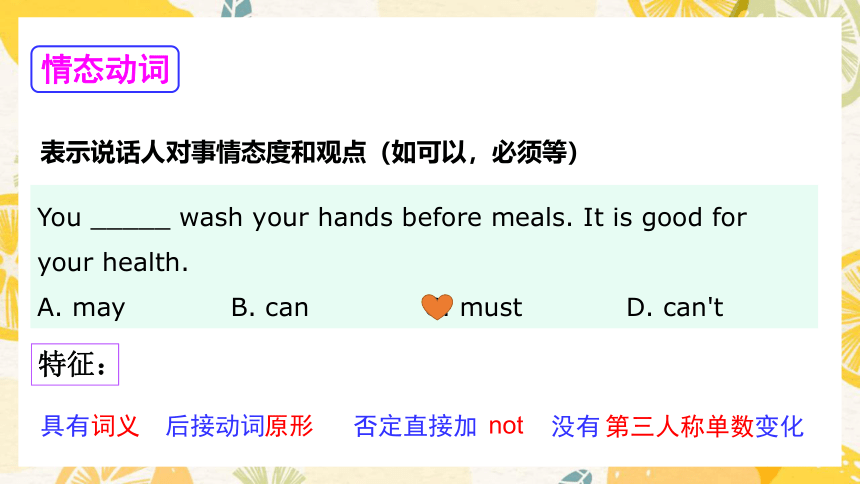
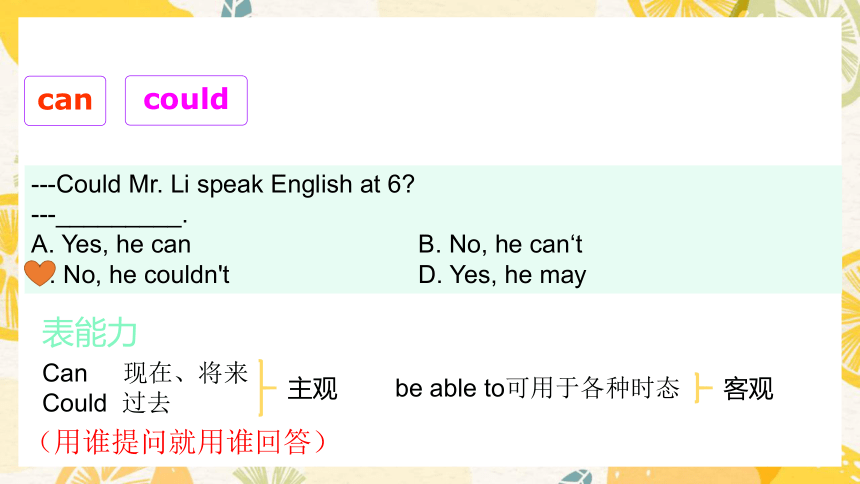
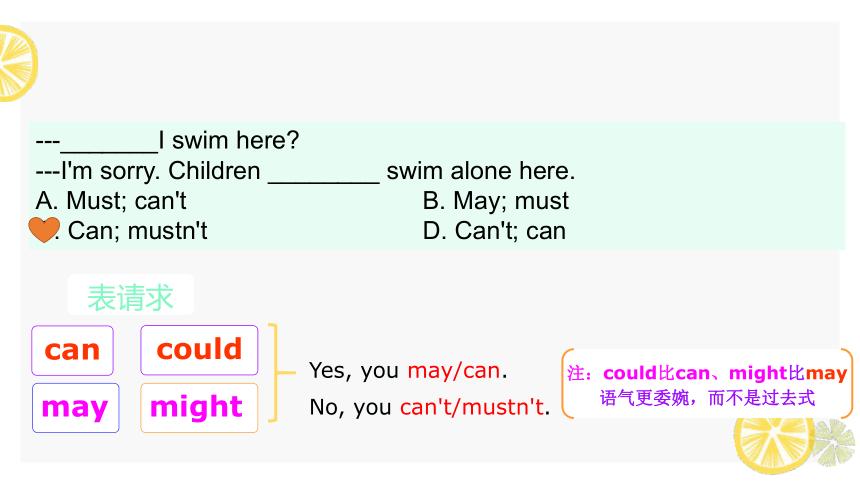
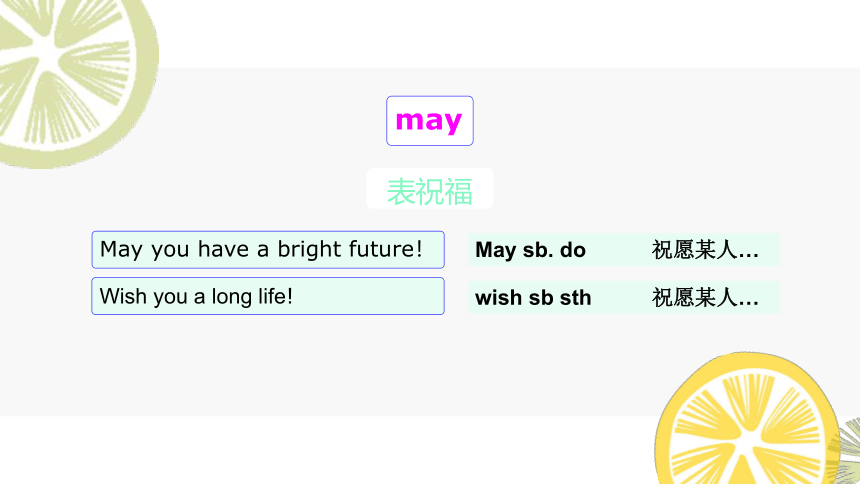
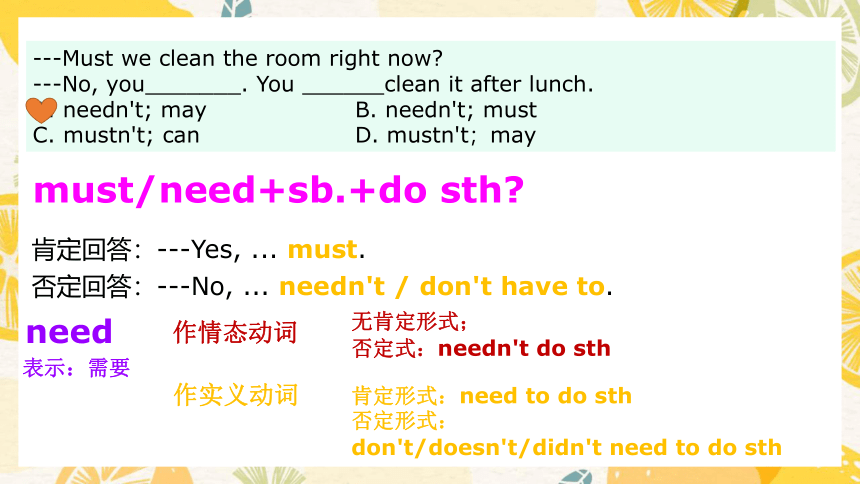
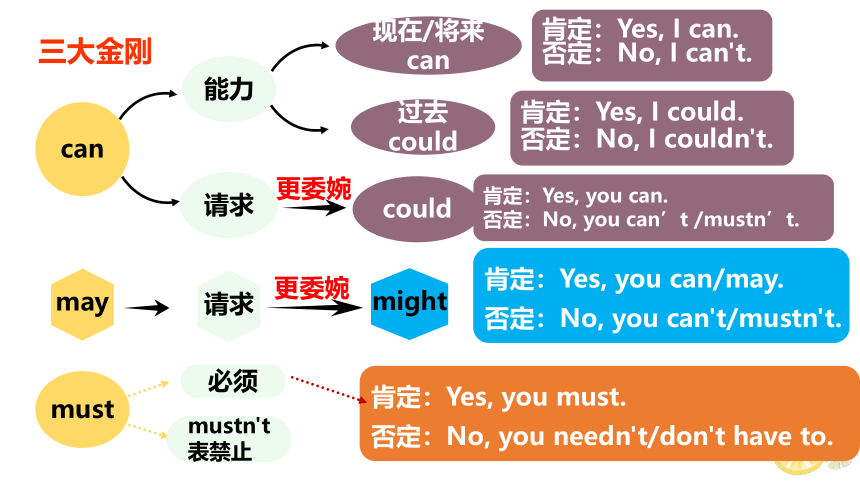
文档简介
(共14张PPT)
情态动词
You _____ wash your hands before meals. It is good for your health.
A. may B. can C. must D. can't
情态动词
特征:
具有
后接动词
否定直接加
没有 变化
表示说话人对事情态度和观点(如可以,必须等)
词义
原形
not
第三人称单数
---Could Mr. Li speak English at 6
---_________.
A. Yes, he can B. No, he can‘t
C. No, he couldn't D. Yes, he may
can
could
表能力
Can 现在、将来
Could 过去
be able to可用于各种时态
(用谁提问就用谁回答)
主观
客观
---_______I swim here
---I'm sorry. Children ________ swim alone here.
A. Must; can't B. May; must
C. Can; mustn't D. Can't; can
表请求
Yes, you may/can.
No, you can't/mustn't.
can
could
may
might
注:could比can、might比may
语气更委婉,而不是过去式
May you have a bright future!
May sb. do 祝愿某人…
Wish you a long life!
wish sb sth 祝愿某人…
表祝福
may
---Must we clean the room right now
---No, you_______. You ______clean it after lunch.
A. needn't; may B. needn't; must
C. mustn't; can D. mustn't;may
肯定回答:---Yes, ... must.
否定回答:---No, ... needn't / don't have to.
作实义动词
作情态动词
无肯定形式;
否定式:needn't do sth
肯定形式:need to do sth
否定形式:
don't/doesn't/didn't need to do sth
need
表示:需要
must/need+sb.+do sth
can
能力
请求
现在/将来
can
过去
could
肯定:Yes, I can.
否定:No, I can't.
肯定:Yes, I could.
否定:No, I couldn't.
could
肯定:Yes, you can.
否定:No, you can’t /mustn’t.
更委婉
may
更委婉
肯定:Yes, you can/may.
否定:No, you can't/mustn't.
请求
might
必须
must
肯定:Yes, you must.
否定:No, you needn't/don't have to.
mustn't
表禁止
三大金刚
推测
肯定
否定
can't > may/might not
不可能 可能不
1.---Have you decided which senior high school to choose
---Not yet. I _______ go to Moonlight school.
A. must B. may C. need D. should
2.---Look, the light in the teacher’s office is still on. Mr. Li is working there. He always works late at night.
---It _______ be Mr. Li. He’s gone to London for a short visit.
A. can't B. mustn’t C. may D. need
must > may/might
一定 可能
三大姐妹
need
should shall
will would
need
01
02
情态动词:
实意动词
肯定:
否定:
need to do sth
don't need to do sth
一般不用于肯定,否定needn’t do sth
They _______ help then. They managed to do it by themselves.
A. didn't need any B. didn't need to
C. needn't any D. didn't need to any
________ we go shopping together ?
Shall
shall
疑问句征求意见,第一人称
Nothing ________ stop me once I have made up my mind.
表示决心
You shall get my kiss when you finish your game . (表允诺)
在陈述句表示说话者的允诺、规定(法律、交规)等,主要用于第二、三人称
let's与 let us在反义疑问句
无论肯定否定,
Let's 永远shall we
Let us 永远will you
shall
It is the rule that every driver shall obey in this city.(表规定)
Let's watch the news on TV,____________
Let us watch the news on TV, ____________
shall we
will you
You ______ pay more attention!
should
should
应该(表责任、义务、建议)
_______ you get me some paper, please
A. Shall B. May C. Will D. Need
用于第二第三人称疑问句,提出请求或征求意见
will/would
shall
should
用于第一人称,表示征求意见、询问
用于第二、三人称, 表示说话人的意图、允诺、命令
will/
would
You shall have my answer tomorrow.
You shall do as I tell you.
You shall be sorry for it one day, I tell you.
It seems unfair that this should happen to me.
常用来表示义务、责任,或符合常理的
询问请求(第二、三人称)
现在的意愿
had better
have to
不得不(客观)
最好
三大怪兽
具有情态动词特征的词组
否定:
used to
过去常常
had better not
used not to
didn’t use to
He used to tell lies.
He used to ________with his parents, but now he is used to _______ with his classmates at school.
A. live; living B. live;live
C.living; living D. living; live
don't/doesn‘t/didn't have to
Thank You
情态动词
You _____ wash your hands before meals. It is good for your health.
A. may B. can C. must D. can't
情态动词
特征:
具有
后接动词
否定直接加
没有 变化
表示说话人对事情态度和观点(如可以,必须等)
词义
原形
not
第三人称单数
---Could Mr. Li speak English at 6
---_________.
A. Yes, he can B. No, he can‘t
C. No, he couldn't D. Yes, he may
can
could
表能力
Can 现在、将来
Could 过去
be able to可用于各种时态
(用谁提问就用谁回答)
主观
客观
---_______I swim here
---I'm sorry. Children ________ swim alone here.
A. Must; can't B. May; must
C. Can; mustn't D. Can't; can
表请求
Yes, you may/can.
No, you can't/mustn't.
can
could
may
might
注:could比can、might比may
语气更委婉,而不是过去式
May you have a bright future!
May sb. do 祝愿某人…
Wish you a long life!
wish sb sth 祝愿某人…
表祝福
may
---Must we clean the room right now
---No, you_______. You ______clean it after lunch.
A. needn't; may B. needn't; must
C. mustn't; can D. mustn't;may
肯定回答:---Yes, ... must.
否定回答:---No, ... needn't / don't have to.
作实义动词
作情态动词
无肯定形式;
否定式:needn't do sth
肯定形式:need to do sth
否定形式:
don't/doesn't/didn't need to do sth
need
表示:需要
must/need+sb.+do sth
can
能力
请求
现在/将来
can
过去
could
肯定:Yes, I can.
否定:No, I can't.
肯定:Yes, I could.
否定:No, I couldn't.
could
肯定:Yes, you can.
否定:No, you can’t /mustn’t.
更委婉
may
更委婉
肯定:Yes, you can/may.
否定:No, you can't/mustn't.
请求
might
必须
must
肯定:Yes, you must.
否定:No, you needn't/don't have to.
mustn't
表禁止
三大金刚
推测
肯定
否定
can't > may/might not
不可能 可能不
1.---Have you decided which senior high school to choose
---Not yet. I _______ go to Moonlight school.
A. must B. may C. need D. should
2.---Look, the light in the teacher’s office is still on. Mr. Li is working there. He always works late at night.
---It _______ be Mr. Li. He’s gone to London for a short visit.
A. can't B. mustn’t C. may D. need
must > may/might
一定 可能
三大姐妹
need
should shall
will would
need
01
02
情态动词:
实意动词
肯定:
否定:
need to do sth
don't need to do sth
一般不用于肯定,否定needn’t do sth
They _______ help then. They managed to do it by themselves.
A. didn't need any B. didn't need to
C. needn't any D. didn't need to any
________ we go shopping together ?
Shall
shall
疑问句征求意见,第一人称
Nothing ________ stop me once I have made up my mind.
表示决心
You shall get my kiss when you finish your game . (表允诺)
在陈述句表示说话者的允诺、规定(法律、交规)等,主要用于第二、三人称
let's与 let us在反义疑问句
无论肯定否定,
Let's 永远shall we
Let us 永远will you
shall
It is the rule that every driver shall obey in this city.(表规定)
Let's watch the news on TV,____________
Let us watch the news on TV, ____________
shall we
will you
You ______ pay more attention!
should
should
应该(表责任、义务、建议)
_______ you get me some paper, please
A. Shall B. May C. Will D. Need
用于第二第三人称疑问句,提出请求或征求意见
will/would
shall
should
用于第一人称,表示征求意见、询问
用于第二、三人称, 表示说话人的意图、允诺、命令
will/
would
You shall have my answer tomorrow.
You shall do as I tell you.
You shall be sorry for it one day, I tell you.
It seems unfair that this should happen to me.
常用来表示义务、责任,或符合常理的
询问请求(第二、三人称)
现在的意愿
had better
have to
不得不(客观)
最好
三大怪兽
具有情态动词特征的词组
否定:
used to
过去常常
had better not
used not to
didn’t use to
He used to tell lies.
He used to ________with his parents, but now he is used to _______ with his classmates at school.
A. live; living B. live;live
C.living; living D. living; live
don't/doesn‘t/didn't have to
Thank You
